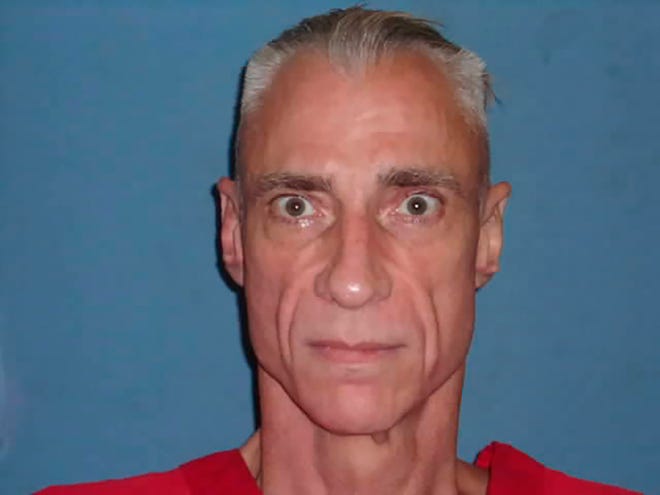Mississippi executes man in rape, killing of 16-year-old girl amid scrutiny of death penalty
 Thomas Edwin Loden Jr.
Thomas Edwin Loden Jr.Mississippi executed a man who raped and killed a 16-year-old girl, bucking a trend in the state and across the nation as the number of executions shrinks. The man became the second inmate to be executed in Mississippi in 10 years.
Thomas Edwin Loden Jr., 58, received a lethal injection at the Mississippi State Penitentiary, also known as Parchman Farm, Wednesday night. He had been on death row since 2001 after pleading guilty to capital murder, rape and four counts of sexual battery against 16-year-old Leesa Marie Gray.
Prior to Loden's execution, Mississippi had executed 128 people since 1940. There have now been two executions in the state since June of 2012.
From 1955 to 1989, the state put to death 35 people using a gas chamber installed at Parchman. In 2002, the first person was executed via lethal injection, which remains the preferred, though not the only, method available to the Mississippi Department of Corrections. Eighteen people have been executed in that way, with Loden becoming the 19th.
Death Penalty Information Center Deputy Director Ngozi Ndulue said the "modern peak" for executions in the United States happened in the late-1990s and early-2000s.
Mississippi performed six executions in 2012, and averaged about one and a half per year between 2002 and that year, but the state did not perform another until last year, when David Cox waived his legal challenges and asked to be executed.
"What we see in Mississippi is similar to other states that have the death penalty," Ndulue said. "You will have, every once in a while, a year with several executions, but there are trends nationwide of executions, less deaths, since its peak in the 2000s."
Here's why death row executions are decreasing across US
There are a number of reasons for the decrease in executions, nationwide and in Mississippi, Ndulue said. One is the availability of lethal injection drugs, as many pharmaceutical companies do not want to provide drugs for lethal injections, or if they do provide them the companies do not want the public to know. The state of Mississippi and MDOC go to great lengths to protect the identities of drug suppliers.
"But, we've seen that even in places that have access to drugs, we're just still seeing less, and that is kind of overall because the death penalty is being used less. We've had less than 50 sentences for the last 8 years and less than 30 executions," Ndulue said.
Another reason for the decrease has been the COVID-19 pandemic. Many states put a pause to putting people to death the last few years, so there may be a slight uptick taking place at the moment, Ndulue said.
There has been some speculation in recent months that there could be an uptick in executions in Mississippi next year. An affidavit filed in federal court by MDOC Commissioner Burl Cain last month showed that many of the execution drugs currently on-hand at Parchman expire in 2024, leaving a relatively short window to use them before needing to acquire new batches.
Ndulue said there have been examples of states attempting to push through a number of executions in a relatively short period of time due to expiring drugs. She specifically cited Arkansas, which in 2017 attempted to execute eight people in a 10-day-span. Ultimately, four of the eight were killed.
Ndulue said there could be potential actions taken to delay impending executions, but those vary based on specifics of each case. Loden and four other people on death row recently attempted to receive a stay from a federal court by challenging the state's controversial three-drug execution protocol but were unsuccessful. He had also exhausted a number of legal challenges in state courts.
Failed executions in states across the country spark scrutiny
Several states have been under scrutiny due to recent lethal injection failures, which is the most widely used death penalty method in the U.S.
States across the country that use lethal injection have encountered multiple problems with the method, including needles disengaging, issues with lethal chemicals and difficulty in finding usable veins — resulting in botched cases.
Following several failed lethal injections, Alabama Gov. Kay Ivey sought a pause in state executions in November and ordered a "top-to-bottom" review of the state's capital punishment system.
According to Jeworski Mallet, deputy commissioner of institutions for the Department of Corrections, Mississippi has done “mock executions and drills” on a monthly basis to avoid a botched execution.
Three anti-death penalty activists gathered outside of the Mississippi State Capitol Tuesday morning asking Reeves to prevent Loden's death.
Sheila O'Flaherty, who has been advocating against the death penalty for about four decades, said she would be at Parchman Wednesday night to protest, just as she has done for every execution in the state since Jimmy Lee Gray was put to death in 1983.
"I want them to know that there are some Mississippians that are against this," O'Flaherty said. "There are some Mississippians who believe in a more peaceful existence."
1 comment:
Dead is dead whether it takes a couple of tries shouldn't really matter.
Post a Comment